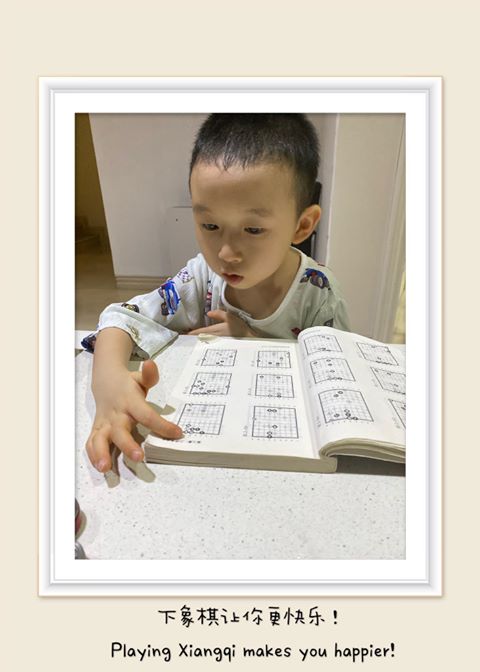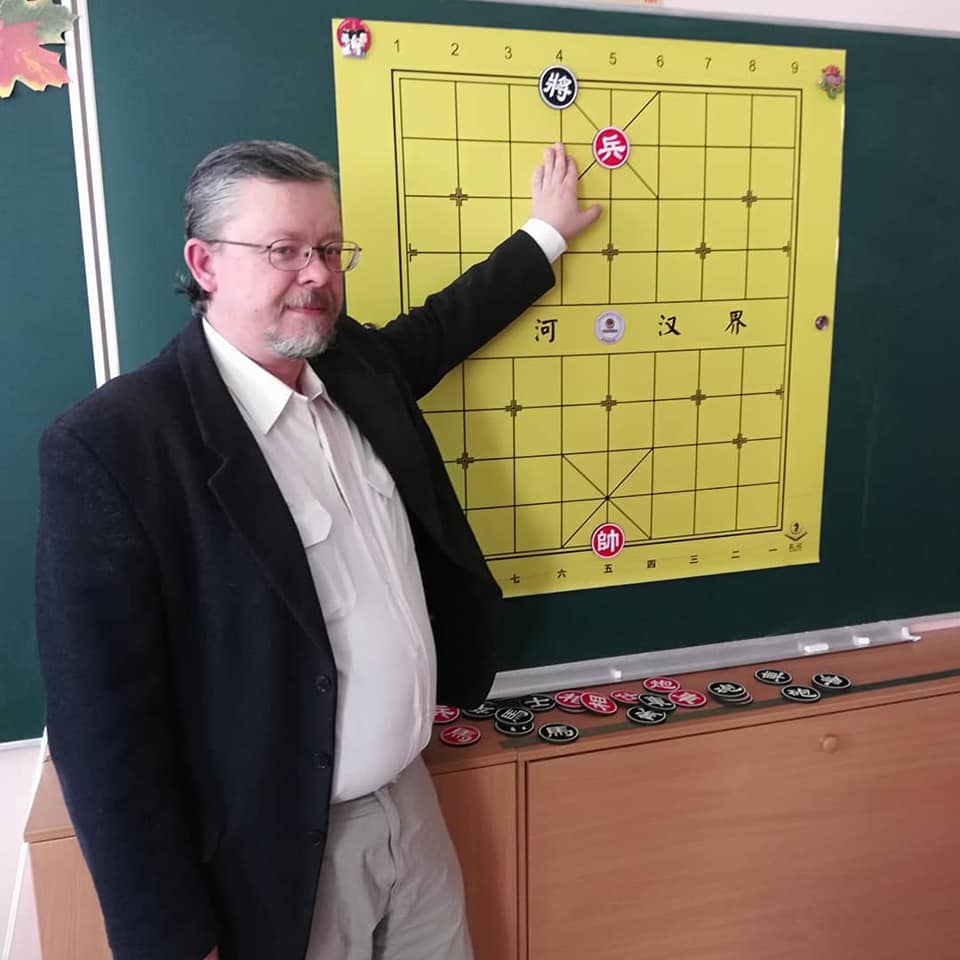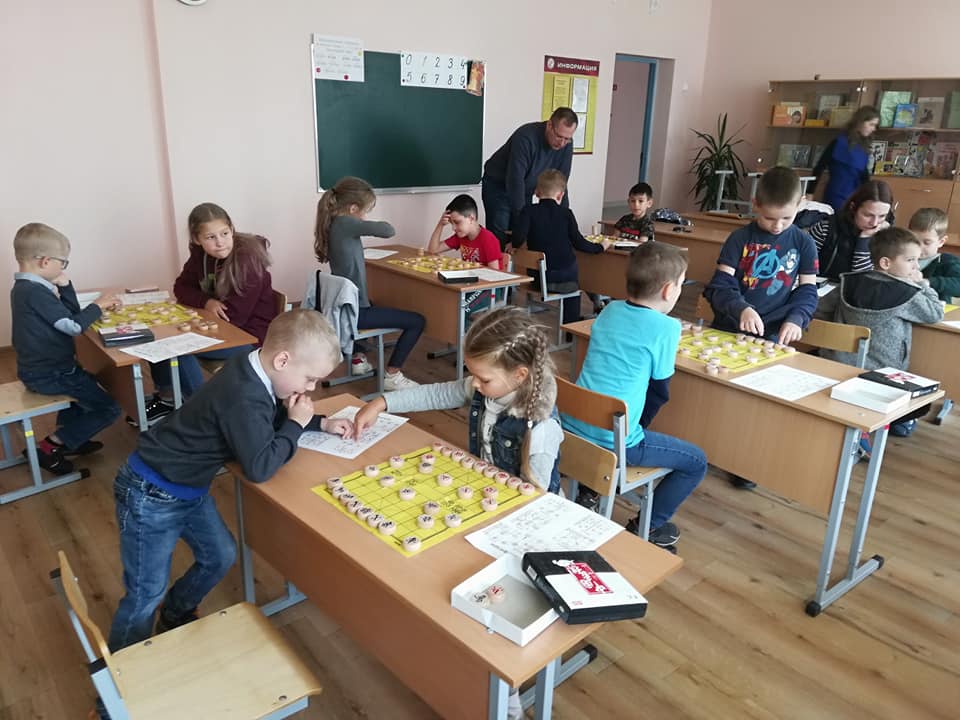The Benefits of Learning Xiangqi (Chinese Chess) for Children
This article is a continuation of The Benefits of Learning Xiangqi. In the previous article, the targeted readers were adults. One of the most important things handing down the tradition and culture of Xiangqi is to develop the next generation. But,
 WHAT ARE THE BENEFITS OF LEARNING XIANGQI FOR CHILDREN?
WHAT ARE THE BENEFITS OF LEARNING XIANGQI FOR CHILDREN?
Some of the benefits mentioned in the previous article would also apply, but children have their own special needs. This article would focus on this issue of children learning Xiangqi and address their needs and circumstances.
Admittedly, the Webmaster has never given much thought on this issue in the past. Recently, the Webmaster has enrolled his children (daughter aged ten and son aged seven) in a Xiangqi course. The Xiangqi classes seem to benefit the children in many unexpected ways, and the Webmaster had decided to share his insights in this article. It would also showcase some of the research that he has found on the internet.
- Attributes gained by children when learning Xiangqi
- Social Benefits
- Cultural Benefits
- Possible Harms
Attributes gained by children when learning Xiangqi
Adults can benefit from Xiangqi in many different ways. However, with children, the benefits are more focused on character building and temperament and maturity. (1) The following is a list of the ten most significant gains.
Patience
Have you ever had the thought that your child can never seem to stop just for one single moment? Can’t they focus on doing one thing at one time?
Good news, Xiangqi can help.
If the child is interested in Xiangqi, he would sit down and slowly learn to think his way out of solutions. A child would need to sit down and look at the board can slowly cultivate patience. Instead of screaming at your child to tell him to sit down, he would learn to do so subtly.
Focus
As a continuation of the previous point, the child would soon learn that he would need to focus his efforts on whatever the position he has on the board. He cannot get away with simply ‘pushing’ the pieces. The fact that he would lose pieces or not be able to solve puzzles would force him to think twice.
And that is one of the greatest benefits that Xiangqi can give a child: to allow him to understand the importance of thinking twice and focus on the situation.
Logical Thinking and Improved Anticipation
 When my daughter and son were playing Xiangqi, they would often voice their opinion on why they felt that a move was good or bad. I would never tell them that it was good or bad. Instead, I would discuss with them:
When my daughter and son were playing Xiangqi, they would often voice their opinion on why they felt that a move was good or bad. I would never tell them that it was good or bad. Instead, I would discuss with them:
“If you make this move, what would happen?”
“Would it endanger other pieces?”
“Would it place your King in checkmate?”
“Is it beneficial?”
These are some of the questions that I ask them.
Over time, I have found that they started to show some logic in their thinking. They would begin to say,
“If I did this, he would do that…”,
“If he moved that piece here, it would not be a good idea because of this and that…”
The idea of logical analysis was slowly infused without me having to force anything. They would learn to anticipate what the opponent might do and try to do something about it. There, two important life-skills learned without having to send them to any brain development class.
Another thing to note was that they could learn logical thinking at their own pace, with their preference. Each child is unique in their learning abilities, and playing Xiangqi can help in every scenario.
Learning from their mistakes
Kids tend to give up if they lose too often and too quickly in Xiangqi. However, if they could go over their mistakes, they would see what they had done wrong and the benefits of making the right moves.
This is the reason why post-mortem analysis is so important. With post-mortem analysis, they get to play the game repeatedly and learn to recognize their mistakes. They would not necessarily know how to solve them, but they will see for themselves that it was a mistake.
And children HATE making mistakes. Kids with a more competitive disposition would be disgusted. I’ve seen children throw tantrums, but generally speaking, if they were let to simmer, they would learn from their mistakes and become more careful.
Viewing the Same Problem from Different Angles and Establishing Priorities
As a continuation of the previous points, children learn to tackle problems from different angles. They learn subconsciously that there is more than one path from point A to point B. Some would require a u-turn, some would require back trekking, some are not straight direct paths.
Perhaps more importantly, Xiangqi is the best method in teaching children to view things from a wider and broader angle.
From my own experience, when I started playing Xiangqi seriously in school decades ago, I was always focusing on one aspect of the game. For example, I tried to capture enemy material and forgot to checkmate or prevent more important pieces from being captured.
An allegory would be the concept of the one tree and the forest. I focused on that ‘one tree in the forest.’ Over time and many losses later, I understood that that ‘one tree’ was but one of the trees in a forest. I am still learning Xiangqi, but now, I know better than you would have to consider the ‘forest,’ or from a more wholesome perspective when approaching problems.
Sure, the goal of checkmating the enemy king would be the same, but after learning Xiangqi, you learn that there are many more factors to consider, and not all of the options possible were correct, feasible, and not painful. And most importantly, some issues need not be addressed.
Without knowing it, they learn to prioritize and do what the most important thing is. They know that checkmating the enemy King is the ultimate goal, and other issues would be less important. Slowly, they learn to let the goal of less important priorities.
The process of decision making would be greatly enhanced. Over time, it would teach the Xiangqi player or child to be more tolerant of the different views and approaches to the same problem.
You do not need to teach them anything; they learn it sublimely.
Improved Memory
I have played Xiangqi for decades, and I still make the same mistakes now and then. It is inevitable.
Children have memories like sponges, and if they made the same mistake a few times, they have a better chance of remembering them. It is also the case with losing to the same combination or losing a chess piece to the same tactic.
Over time, they learn to recognize a danger when a particular combination is seen and will try to prevent the bad memory of losing again.
But there is more to improve their memory.
The most fundamental lesson that each child should start with is the tactical combinations learned through the Basic Kills. For example, there are specific ways of winning with a particular combination if the situation permits. As in other aspects of Xiangqi, they would learn them subtly and understand them in a manner that they understood for their age.
I have seen my children learn the basics of tactical combinations with gusto because they understand that it was a quick and efficient way of winning. Their Xiangqi teacher did not have to demonstrate too many times how a tactical combination could win. Just a few demonstrations and my children could remember them. A few weeks later, they might have forgotten a step or two, but either they could work out the missing step on their own through logical analysis, or they would try to find out the answers by asking their teacher or me.
In the long run, children will demonstrate improved memories.
The Ability to Withstand Pressure
One of Xiangqi’s greatest benefits to a child would be to instill in him or her the ability to withstand pressure. When the situation is tense on the board, he would be forced to focus and try his best, for he KNOWS that giving up is not an option.
The child would KNOW that he would have to take his chances, but it would not guarantee success. But the rewards would be sweet.
Losing is not a pleasant experience, but if the child perseveres long enough, he would understand that he would improve and that it is not over till it is over.
They understand that there are Hard Knocks in Life.
 Losing would be the ‘norm’ for children when they start playing Xiangqi. If they can be led to learn that losing is okay, they will be for the better. Xiangqi is one of the subtler ways of teaching kids about the school of hard knocks in life.
Losing would be the ‘norm’ for children when they start playing Xiangqi. If they can be led to learn that losing is okay, they will be for the better. Xiangqi is one of the subtler ways of teaching kids about the school of hard knocks in life.
I try to explain to my children that things are not as superficial as they seem and let Xiangqi do the talking. I try to let them have fun when losing, to tease them to forget about the pain of losing but to focus on learning why they lost. It seems to work as from my personal experience; they seem to have taken losses much lighter and have more fun. They are also more eager.
Xiangqi puzzles contain many ingenious traps. Their Xiangqi teacher gives them a few puzzles as homework now and then, and they try to solve them. Many of the puzzles contain variations that that would lead to losses. My children would try them out, and simple as the puzzles might seem, they would often choose the wrong moves. But after failing to find the answers for a few moves, they would succeed and solve the puzzle. Sure, the ‘hard knocks’ hurt sometimes, but over time, they become less sensitive and focus on having fun.
As the saying goes, life imitates Xiangqi, and Xiangqi imitates life (人生如棋,棋如人生). They get to learn about life and the school of hard knocks in a less painful manner, sometimes even having fun in the process.
In short, they become less sensitive to failure and can embrace the challenge of playing Xiangqi.
The Will to Win and Succeed
As mentioned earlier, children hate losing. The key goal would be to allow them to play long enough so that they start winning.
That is why I hired a Xiangqi coach to help them out in this aspect because, as a parent, I could easily get frustrated. From personal experience, they learn to be humble and acknowledge that Xiangqi is difficult but not tough to learn. And they understand that for them to be better and win their compatriots, they would have to put in the effort. In short, they appreciate the fact that SUCCESS DOES NOT COME EASILY, BUT IT IS POSSIBLE IF THEY PUT IN THEIR EFFORT.
Sure, there are ups and downs in life, but sometimes after a short break, they come back stronger and more willing. That is perhaps the BIGGEST AND MOST IMPORTANT LESSON that a parent can teach his children. The ability to pick oneself up after facing setbacks can be easily appreciated by Xiangqi.
Xiangqi teaches about Rules and Responsibility
It would be impossible NOT to learn about rules in life. You can only move the Elephant in a particular way and only capture an enemy piece with the Cannon if only a cannon mount were present.
Children learn about rules very easily. They understand that they CANNOT DO THIS OR THAT if it goes against the rules. If they BREAK THE RULES, they would have to be responsible and deal with their loss.
A parent would not need to teach them the concept of rules. They would learn about it easily and be more compliant.
And children learn about the responsibility that comes with making a move. There are no takebacks in Xiangqi, and often, there are no second chances in life. They understand very quickly that they have to be responsible.
There are many more benefits for a child to learn Xiangqi, but the above ten points are deemed most important by the Webmaster. The benefits mentioned above are on a personal level. Learning Xiangqi has other social and cultural benefits that will be mentioned below.
Social benefits
Work has been one of the foci in my life. As a parent, I have to put food on the table and send the kids to school and provide. However, before Xiangqi, I sometimes did not how to relate or communicate with my children. Sure, I would take them out to trips to amusement parks, overseas trips, or for dinner. But to them, I was more like a chauffeur or any other adult.
But things changed after Xiangqi. My children knew that I played for a long time, and they started watching me play on my mobile once they learned the game a little bit more. More time was spent together, and they approached me more often.
Perhaps, to me, the biggest social benefit was being able to form closer bonds. Forming bonds can also be done in many other ways, but Xiangqi has the unique advantage of teaching them about life in a more subtle manner. For example, if your children face issues in school, we could talk about them in various manners. If they knew Xiangqi, the principles used in Xiangqi could be used to bring various concepts across very easily.
My wife does not play Xiangqi, but she feels that Xiangqi provided another channel for communication. My kids would ask her when the next Xiangqi lesson was. Sometimes, Xiangqi could be an alternative to watching TV or playing with the I-pad. They tended to be less rowdy and better tempered.
And after learning Xiangqi, my children were introduced to a new world. They made new friends with similar mentalities and have fun. Because the act of playing Xiangqi requires two players to sit down and interact for a given amount of time, children get to form stronger bonds or with their enemies on the board. They get to know another child better.
And over time, they learn to identify the personality traits of their opponents on the board from playing against another person. This is another big social benefit in the Webmaster’s humble opinion.
Another interesting social benefit that the Webmaster would like to mention would be using Xiangqi to explain various social phenomena. For example, I showed my kids a map of the city and compared them to the Xiangqi board. They could easily understand why streets were arranged in a particular manner and what could have been done better.
Cultural benefits
 Xiangqi is also one of the best reflections of the Chinese culture. There are many values that the ancient Chinese have deemed important that have been passed down through generations.
Xiangqi is also one of the best reflections of the Chinese culture. There are many values that the ancient Chinese have deemed important that have been passed down through generations.
For example, the draw in Xiangqi can reflect the core values of (2)
- 仁 benevolence,
- 義 righteousness,
- 智wisdom,
- 禮 courtesy or treating others with respect,
- 信 faith or confidence.
As Xiangqi is embedded deeply in the Chinese culture, learning to play, Xiangqi would allow children to understand the Chinese culture better.
The Webmaster grew up in Singapore, which is a multi-cultural country. From personal experience, learning Xiangqi helped the Webmaster understand the differences in the culture of the Chinese, the Malays, the Indians, and even Western cultures. You would understand better how different races would think and what their values are by comparing them
Disadvantages of Learning Xiangqi
There are disadvantages to learning Xiangqi. However, the consensus is that the advantages of learning Xiangqi greatly outweigh the disadvantages.
Like all games, the Webmaster feels that perhaps the biggest disadvantage is being addicted to the game. Learning Xiangqi or other games like International Chess can be extremely time-consuming.
The Webmaster spent hours playing Xiangqi back in school, but luckily, it did not affect schoolwork. A watchful eye would have to be put on the child to prevent him from being overly engrossed in the game.
Another possible disadvantage of playing Xiangqi is that your child could be labeled as a nerd, but then again, this might not be a bad thing.
A friend once made an interesting comment that learning Xiangqi exposes the child to the ‘dirty’ side of real-life too early. Children should be left to mature at their own pace as children.
The Webmaster feels that Xiangqi would indeed mature the child, but this ‘disadvantage’ was controversial. If children could learn about life less painfully than through setbacks and mishaps directly, it would cause less ‘growing pains.’ Nevertheless, this was an interesting view by my friend, but so far, children with whom I have grown up playing Xiangqi seem to farewell.
In general, learning Xiangqi would be beneficial and a good option for children to develop life skills and learn about life.
References
1. 风吟楼. 下象棋的十大好处. 360doc.com. [Online] Jan 2, 2018.
2. 閒來一樂. 玩中國象棋好處多多,想像不到吧. 每日头条. [联机] 2017年Oct月12日. [引用日期: 2020年Sept月9日.] https://kknews.cc/zh-tw/history/l2oraoe.html.
3. Home Page of Xiangqi Mind Train Academy. Xiangqi Mind Train Academy 智力象棋学院. [Online] [Cited: Sept 10, 2020.] http://learnxq.com/.
